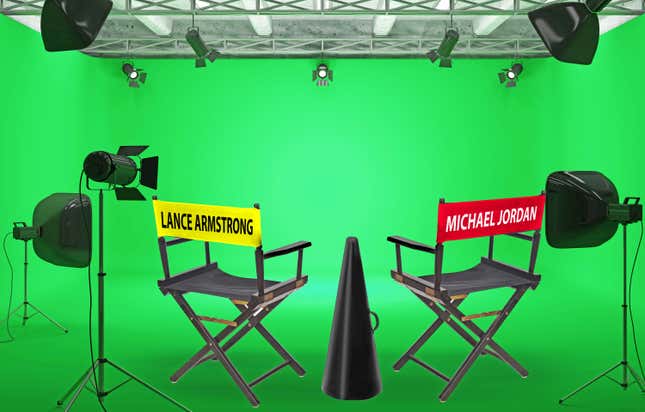
Why would a celebrity athlete want to do a documentary? What’s in it for them? What do they have to prove? And why now?
For obvious reasons, I have recently found myself asking these questions.
Over the years, the industry of sports documentaries has grown. But as these made-for-TV events get bigger and bigger, the journalistic integrity between subject and filmmaker has declined.
At their worst, these kinds of sports documentaries turn into biopics for the purpose of athlete exaltation or redemption.
These kinds of documentaries are not journalistically sound, they are sports propaganda.
Take, The Last Dance. It is fun, intriguing, still too long, yet, overall, entertaining. But don’t forget that the series is, conveniently, co-produced by Jordan’s production company.
In the series, Jordan is the protagonist and, essentially, the executive producer. One of the Jordan rules for this doc is to run production plans by MJ and make him look as good as possible.
You don’t need to be a film critic to know this.
In every episode, there is a scene where someone ticks Jordan off. Then, Jordan recounts obliterating them. When Seattle Supersonics coach, George Karl, walked by Jordan at a restaurant before the ‘96 Finals, Jordan was motivated to crush Seattle. After LeBradford Smith dropped 37 points against Jordan, he went on to score 36 points by halftime against Smith’s Bullets the next night. And, most recently, Jordan “had no problem with the glove.” But it was Peyton who kept Jordan under his season point average in games four, five, and six.
ESPN can’t build an entire series around the idea that one should not cross Jordan, then construct a narrative that crosses Jordan in any way.
The Last Dance may be the latest athlete-approved documentary, but there seems to be another one lurking around the bend. Yesterday, ESPN released a trailer for their next film. It’s not about another team, or an event. It is a portrait of an athlete. It’s called Lance.
Why would Armstrong want to do a documentary? And why now?
Perhaps for the same reason as Jordan, Tiger, and Brady. These notoriously aloof and apolitical athletes want to curate their own narrative.
Other athletes have worked with filmmakers to tell their stories, too. In ESPN’s Fab 5 documentary the starting five, excluding Chris Webber, produced or executive produced the series. And in Winning Time: Reggie Miller vs The New York Knicks, Reggie Miller is listed as a producer under his formal name “Reginald Miller.”
History is written by the winners. And these champions are writing the final chapters of their athletic legacy unchecked, without a real dissenting opinion.
Jordan wants you to think of him as the greatest basketball player ever. Tiger wants you to forget about that extracurricular marriage stuff and pronounce him “back.” Brady wants to establish himself as a timeless superhuman.
What does Lance want you to hear? According to the trailer, his “truth.”
The truth about Armstrong is that he is a liar and a cheater at the highest level. His “truth” in the film may be more complex. But from the trailer, it sounds like Armstrong wants more than truth, he wants redemption.
When Lance premiered at the 2020 Sundance Film Festival, it received mixed reviews. But one popular film critic site, Indiewire, called the protagonist “desperate for a second chance.”
Unlike Jordan, Armstrong does not have a production company working in conjunction with ESPN to tell his story. But the seven-time Tour de France champion has had seven years to construct a press release about himself and his past. Don’t think he isn’t ready to recite it in front of cameras.
Star athletes are not the only ones taking hold of their own narratives. In 2015, Derek Jeter created The Players’ Tribune to do just that. And in 2017, Lebron James took the same idea and created UNINTERRUPTED.
Full disclosure, while in grad school I took a job as an associate producer at the Players’ Tribune. I worked with the company and their athletes for seven months before being laid off in April due to the coronavirus pandemic.
The athletes storytelling model works when it reveals a perspective on issues like mental health, race and gender bias. Where it fails is when the athlete is controlling his or her own life story.
Acclaimed documentarian Ken Burns recently told the Wall Street Journal that he would “never” sign on to do a film in conjunction with the main character and their production company.
“If you are there influencing the very fact of it getting made it means certain aspects that you don’t necessarily want in aren’t going to be in, period,” Burns told WSJ contributor, Chris Kornelis. “And that’s not the way you do good journalism…and it’s certainly not the way you do good history, my business.”
So, why would a celebrity athlete want to do a documentary? What’s in it for them? What do they have to prove? And why now?
They have money, they have fame, and, even if they made mistakes, they seem to have it all. All that’s left is for the history to be (personally) written by the victor.